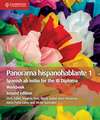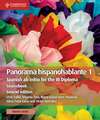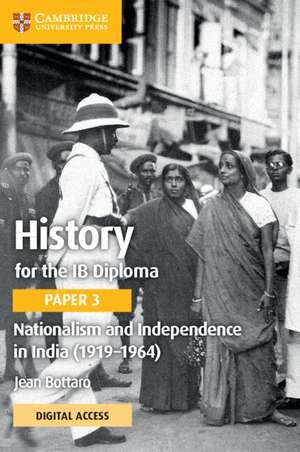History for the IB Diploma Paper 3 Nationalism and Independence in India (1919–1964) Coursebook with Digital Access (2 Years): IB Diploma
Autor Jean Bottaroen Limba Engleză Mixed media product – 26 ian 2022
Din seria IB Diploma
-
 Preț: 73.77 lei
Preț: 73.77 lei - 23%
 Preț: 1322.24 lei
Preț: 1322.24 lei -
 Preț: 412.32 lei
Preț: 412.32 lei - 9%
 Preț: 858.69 lei
Preț: 858.69 lei -
 Preț: 242.67 lei
Preț: 242.67 lei -
 Preț: 242.19 lei
Preț: 242.19 lei -
 Preț: 79.14 lei
Preț: 79.14 lei -
 Preț: 367.75 lei
Preț: 367.75 lei -
 Preț: 368.95 lei
Preț: 368.95 lei -
 Preț: 158.81 lei
Preț: 158.81 lei -
 Preț: 167.15 lei
Preț: 167.15 lei -
 Preț: 221.39 lei
Preț: 221.39 lei -
 Preț: 348.79 lei
Preț: 348.79 lei -
 Preț: 114.53 lei
Preț: 114.53 lei -
 Preț: 157.63 lei
Preț: 157.63 lei -
 Preț: 387.85 lei
Preț: 387.85 lei -
 Preț: 183.54 lei
Preț: 183.54 lei -
 Preț: 434.47 lei
Preț: 434.47 lei -
 Preț: 243.64 lei
Preț: 243.64 lei - 23%
 Preț: 1215.91 lei
Preț: 1215.91 lei -
 Preț: 381.77 lei
Preț: 381.77 lei -
 Preț: 156.67 lei
Preț: 156.67 lei -
 Preț: 255.23 lei
Preț: 255.23 lei -
 Preț: 407.55 lei
Preț: 407.55 lei -
 Preț: 157.14 lei
Preț: 157.14 lei - 8%
 Preț: 505.53 lei
Preț: 505.53 lei -
 Preț: 167.78 lei
Preț: 167.78 lei -
 Preț: 386.09 lei
Preț: 386.09 lei - 16%
 Preț: 797.99 lei
Preț: 797.99 lei -
 Preț: 158.11 lei
Preț: 158.11 lei - 9%
 Preț: 858.26 lei
Preț: 858.26 lei -
 Preț: 242.43 lei
Preț: 242.43 lei -
 Preț: 114.77 lei
Preț: 114.77 lei - 8%
 Preț: 424.77 lei
Preț: 424.77 lei - 23%
 Preț: 1288.91 lei
Preț: 1288.91 lei -
 Preț: 181.92 lei
Preț: 181.92 lei - 9%
 Preț: 893.93 lei
Preț: 893.93 lei -
 Preț: 347.74 lei
Preț: 347.74 lei -
 Preț: 73.54 lei
Preț: 73.54 lei -
 Preț: 290.62 lei
Preț: 290.62 lei -
 Preț: 79.14 lei
Preț: 79.14 lei -
 Preț: 487.74 lei
Preț: 487.74 lei - 19%
 Preț: 426.58 lei
Preț: 426.58 lei -
 Preț: 330.34 lei
Preț: 330.34 lei -
 Preț: 368.67 lei
Preț: 368.67 lei -
 Preț: 242.69 lei
Preț: 242.69 lei -
 Preț: 242.22 lei
Preț: 242.22 lei - 8%
 Preț: 476.66 lei
Preț: 476.66 lei -
 Preț: 411.37 lei
Preț: 411.37 lei -
 Preț: 168.05 lei
Preț: 168.05 lei
Preț: 292.29 lei
Nou
Puncte Express: 438
Preț estimativ în valută:
55.94€ • 58.18$ • 46.18£
55.94€ • 58.18$ • 46.18£
Carte disponibilă
Livrare economică 24 martie-07 aprilie
Preluare comenzi: 021 569.72.76
Specificații
ISBN-13: 9781009190121
ISBN-10: 1009190121
Pagini: 326
Dimensiuni: 157 x 228 x 14 mm
Greutate: 0.45 kg
Ediția:2Nouă
Editura: Cambridge University Press
Colecția Cambridge University Press
Seria IB Diploma
Locul publicării:Cambridge, United Kingdom
ISBN-10: 1009190121
Pagini: 326
Dimensiuni: 157 x 228 x 14 mm
Greutate: 0.45 kg
Ediția:2Nouă
Editura: Cambridge University Press
Colecția Cambridge University Press
Seria IB Diploma
Locul publicării:Cambridge, United Kingdom
Cuprins
1. Introduction; Chapter 2. The origins of Indian nationalism and the impact of the First World War: 2.1. What were the origins of the nationalist movement in India?; 2.2. How did the First World War affect India?; 2.3. To what extent did the demands for Home Rule boost the nationalist movement?; Chapter 3. Political developments between 1919 and 1935: 3.1. To what extent was the Amritsar Massacre a turning point?; 3.2. How did the Government of India Act (1919) affect India?; 3.3. What was the significance of the Simon Commission?; 3.4. How effective were the Round Table Conferences?; 3.5. What were the responses to the Government of India Act, 1935?; Chapter 4. The role and importance of key groups and individuals: 4.1. What role did the Indian National Congress play in the nationalist movement?; 4.2. How important was the All-India Muslim League in the nationalist movement?; 4.3. Why was Gandhi so important to the nationalist movement?; 4.4. What was Nehru's contribution to the nationalist movement?; 4.5. How significant was Jinnah's role in the nationalist movement?; Chapter 5. The struggle for independence: 5.1. What was the Non-Cooperation movement?; 5.2. Why was the Salt March so significant?; 5.3. What happened during further Civil Disobedience campaigns?; 5.4. Why was the 'Quit India' campaign significant?; Chapter 6. The growth of Muslim separatism: 6.1. What was the background to the growth of Muslim separatism?; 6.2. When and how did the 'Two Nation' theory develop?; 6.3. How significant was the Lahore Resolution?; Chapter 7. The impact of the Second World War: 7.1. How did the Second World War affect India?; 7.2. What role did Subhas Chandra Bose play?; 7.3. Why did the Cripps Mission fail?; 7.4. How did the war affect British power in India?; 7.5. What was the situation in India after the war?; Chapter 8. Independence and partition: 8.1. What role did Mountbatten play?; 8.2. How did India achieve independence?; 8.3. What were the reasons for the partition of the South Asian subcontinent?; Chapter 9. Post-independence India: 9.1. What ethnic and religious conflicts did India face?; 9.2. How were the princely states incorporated?; 9.3. Why was there conflict with Pakistan over Kashmir?; 9.4. To what extent were Nehru's domestic policies successful?; Chapter 10. Exam practice; Further Reading; Index.
Descriere
Comprehensive books to support study of History for the IB Diploma Paper 3, revised for first assessment in 2017.
